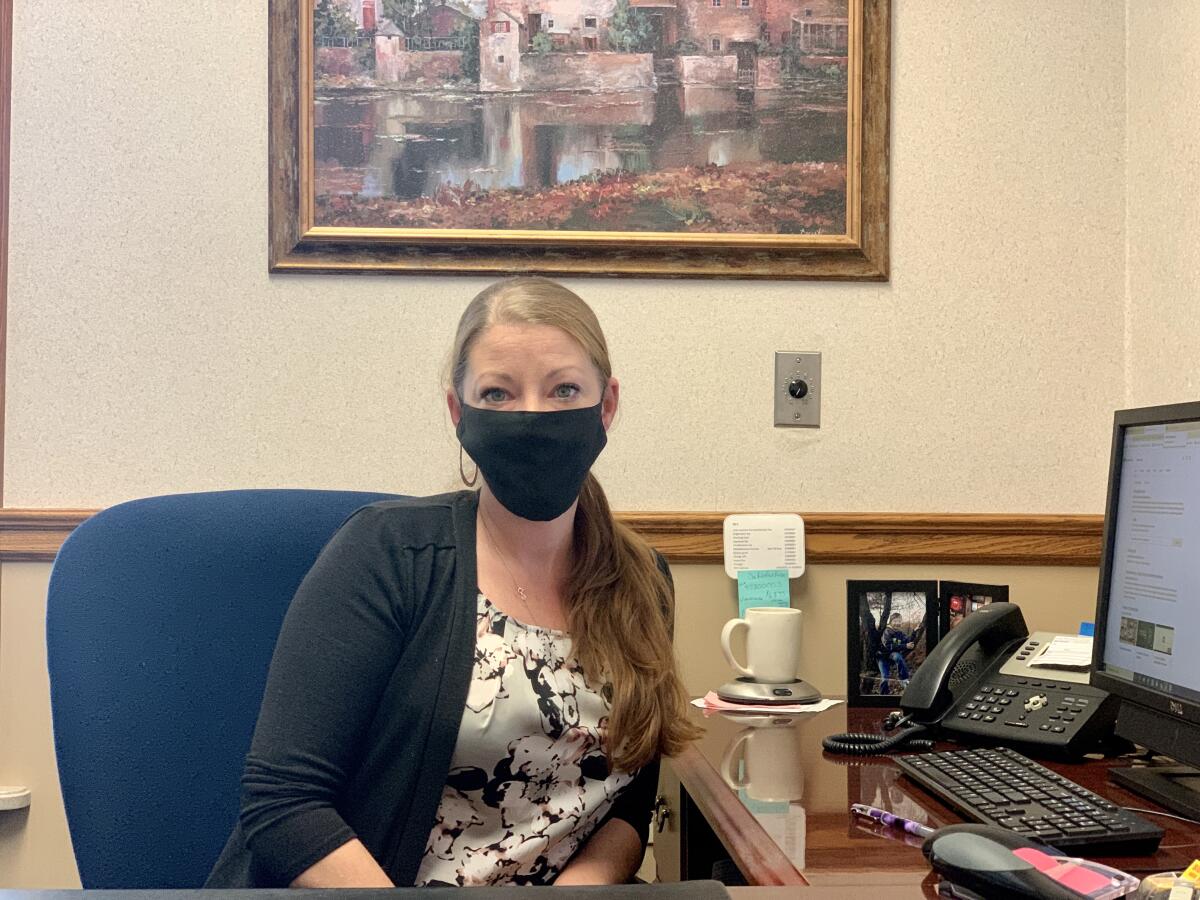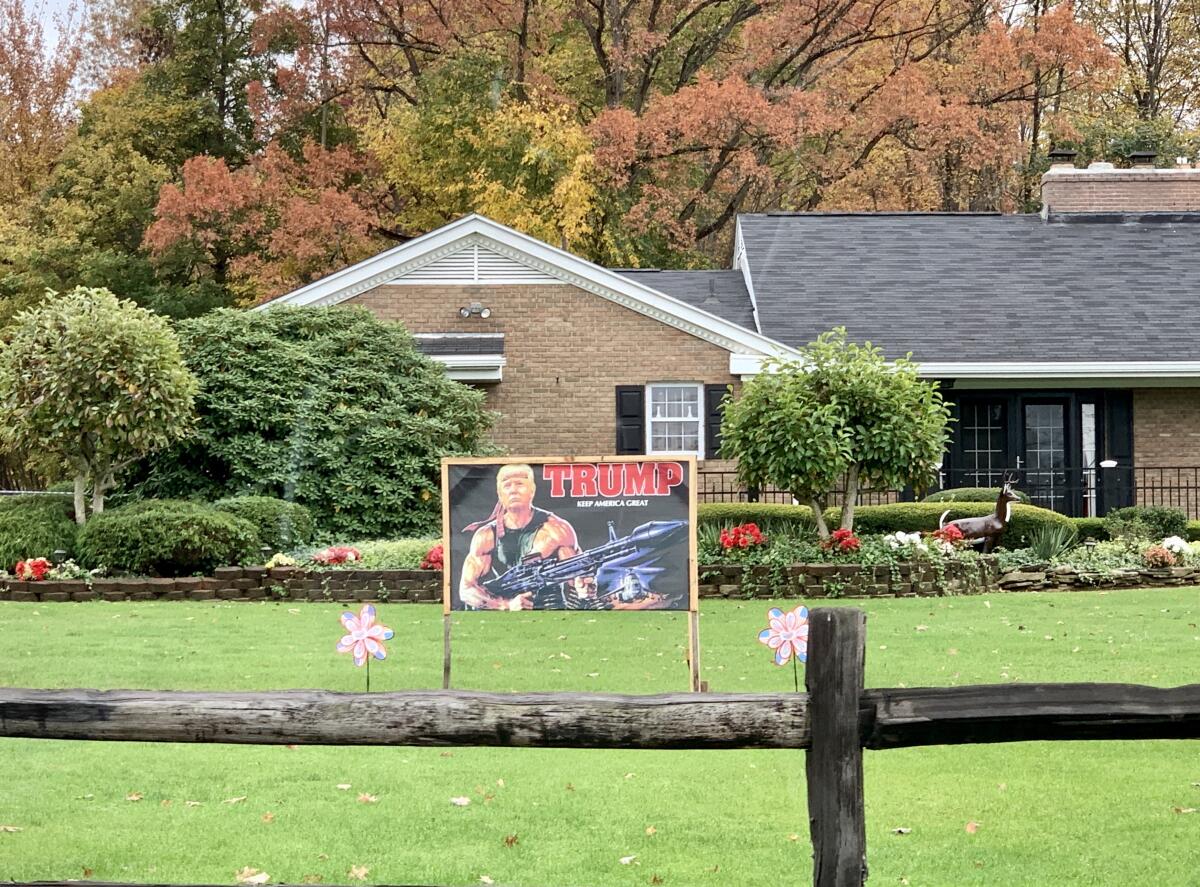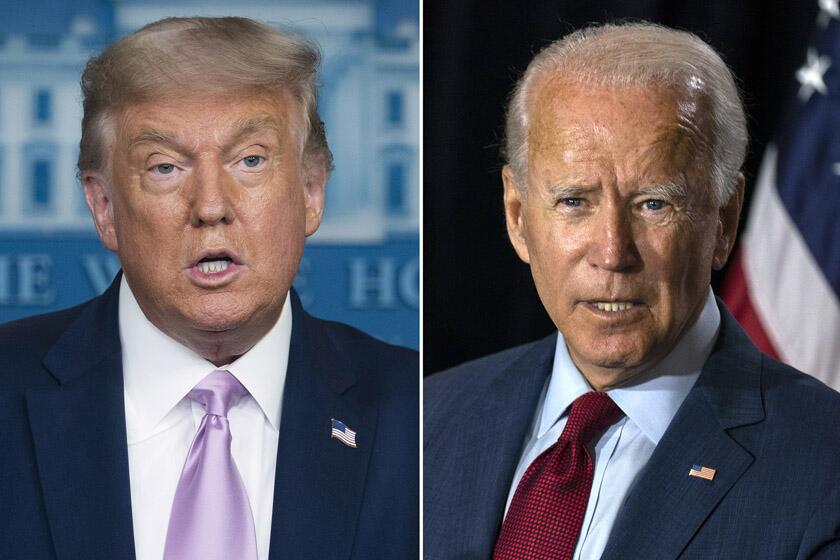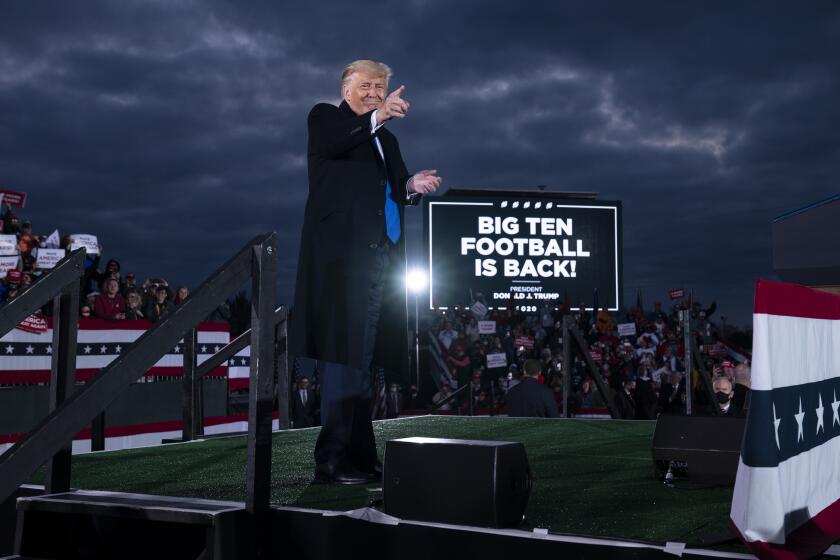Meet the ‘shy’ Biden voters quietly living in Pennsylvania’s Trump country

- Share via
NEW CASTLE, Pa. — Jami Colich loves everything about New Castle, her home in western Pennsylvania. The fact her kids go to school with the children of her former classmates. The ability to text the principal or superintendent whenever she likes. The familiar faces. The easy rhythm.
Colich has lived her entire 37 years in this town of 20,000, save for a brief time in Texas. She hated the cookie-cutter housing developments and pancake-flat landscape of the Houston area.
But New Castle, with its century-old homes and dense woods bursting in technicolor, has come to feel a lot less welcoming than it used to. This is Trump country, red as an autumn leaf, and Colich supports Joe Biden, though she doesn’t make a big noise about it.
“We are the minority,” she said of those backing the Democratic former vice president. “At least as far as vocally.”
Colich, a speck of blue in a Republican sea, is like many Biden voters around here who feel it best to keep their heads down.
The election of President Trump, which shocked many pollsters and reputed experts, gave rise to a much-discussed species: the shy Trump voter, a citizen so cowed by critics and the media they won’t dare express their feelings out loud. Trump calls them “a silent majority,” and his backers believe that untold millions who lie to political pollsters, or refuse to take part in opinion surveys, will again stun the world, defying predictions and delivering the president a second term next week.
Less noted are the shy Biden voters, who may quietly help the Democrat chip away at Trump’s base in small-town and rural America.
Bloomberg’s new TV ads for Biden in Texas and Ohio come as Trump’s money woes force him to scale back his Florida ad spending.
Pennsylvania, which Democrats once reliably counted on, is a keystone of this presidential campaign. Trump carried the state in 2016, a narrow upset that helped put him in the White House despite losing the popular vote to Hillary Clinton. It will be tough for either candidate to win this time without its 20 electoral votes.
And though polls show Biden holding a small but steady lead in Pennsylvania, owing to his strong support in the cities and suburbs, he can’t seize the state back if Trump buries him in places like New Castle and the rural areas that surround it.
The president prevailed in Lawrence County, where New Castle sits not far from the Ohio border, by a whopping 62% to 34% over Clinton. He won most of its neighboring counties by similar margins.
Colich voted four years ago for Clinton. People who know her know she supports Biden and his running mate, California Sen. Kamala Harris.
But there is no sign outside her home, where Colich lives with her longtime partner and their two children. When conversations turn to politics — and everything these days is political: the COVID-19 pandemic, the U.S. Postal Service — Colich quickly changes the subject. She advises her children, ages 11 and 15, to do the same.
It saddens her. “I’m just so very disappointed in what I thought I had, this small-town living … and now the division is palpable,” Colich said.
She works as a lender in a community bank downtown. A block away, on her ride to and from work, is an upscale home bearing multiple pro-Trump signs, including one in the frontyard portraying the president as Rambo, the armed-to-the-teeth mercenary played in movies by Sylvester Stallone. Nearby, a red barn carries a banner belligerently declaring the owner’s pro-Trump sentiments.
The hint of menace, Colich believes, is deliberate. “Trump supporters aim to be intimidating,” she said.

It is, of course, impossible to know the number of people on either side of the political divide who won’t openly state their opinions and whether those “hidden” voters, supposedly undetected by pollsters, are enough to make a difference this election. But there is no doubt their reticence reflects a change that has taken place in recent years, as an individual’s partisan identity has increasingly become a social and cultural marker as well — and something that incites anger and hostility.
“Polarization has been going on for several decades, but it has become more severe and more emotional in the Trump era,” said Q. Whitfield Ayres, a longtime Republican pollster and strategist. “Our country is so deeply polarized that supporting a candidate who is different from your family or your social network subjects you to criticism and shunning and other really unpleasant social behaviors.”
For some the best remedy is silence, or something close to it.
Jason B., who lives in rural Lawrence County, is convinced he’s the only Biden supporter at the small firm where he works. He figures almost all his friends are Republicans, including some who “loudly support Trump.” So he steers clear of politics, to avoid confrontation.
“If I was 30 years old, I may not be handling it the same way I do at 40,” said Jason, who asked his last name not be used to shield him from repercussions. “I just keep a very low profile.”
In Hermitage, a town of about 16,000, Democratic attorney Michael T. Muha supports Biden but understands Trump’s local appeal.
This hilly region of Pennsylvania is archetypal Rust Belt country, where the steel industry withered and people’s hopes and livelihoods faded along with it. Although the state’s population grew in the last decade, it continues to shrink in the western portion. Today, one of the top regional exports is young minds.
“Too many kids graduate from high school, move away and never come back,” said Muha, a member of the Hermitage Board of Commissioners, or city council. “The steel mills collapsed and jobs are scarce, unless they’re minimum wage or slightly higher. As a result, people looked to a guy who sold them a bill of goods.
“Trump didn’t really do anything to help those people,” Muha said, though he at least spoke to their concerns.
There are plenty who would disagree with that assessment. The president is expected to again carry rural Pennsylvania, including Lawrence County. There are fat clusters of Trump-Pence signs alongside highway exits and sprinkled throughout residential neighborhoods. The congressman here, Mike Kelly, is a big Trump fan and a favorite to win his sixth term.
Muha believes Biden will do considerably better than Clinton, based on some of the conversations he’s had with constituents — in private.
“I’ve talked to many of them who’ve said, ‘I’m going to vote for Joe Biden, but I’m not putting a sign in my frontyard,’” Muha said. They don’t want to provoke their neighbors.
Donald Trump won the coveted Ohio by 8 percentage points in 2016. Now he’s playing defense there, underscoring his struggle for reelection in the campaign’s final days.
Julie Slomski, 43, a Democrat running for state Senate in Erie, said she, too, meets plenty of Democratic voters who express their support in hushed tones and hurried conversations.
Among the refrains she often hears: “I can’t talk to you too long. I don’t want my neighbor to see I’m a Democrat,” or “I’m afraid to put up that sign because I can’t afford to have my neighbor to be mad at me.”
As Caroline James can attest, that is not an unreasonable concern.
A staunch Biden supporter, she has several signs promoting the Democratic ticket, including a gigantic placard mounted on a wooden stand in her yard in Erie. One day, out walking her two dogs, she noticed the sign had fallen over. “I’m thinking nothing of it. Maybe it’s the wind, the rain,” said James, a self-described senior citizen who declined to give her age.
When she tried to lift the sign back up, she noticed bullet holes: four of them. James’ five grown children — four of whom are Trump supporters — urged her to remove all her pro-Biden paraphernalia, out of concern for her safety. But James refuses.
“This is a free country,” she said. “I am not going to take my signs down.”
Barabak reported from San Francisco and Mason from New Castle, Pa.
More to Read
Get the L.A. Times Politics newsletter
Deeply reported insights into legislation, politics and policy from Sacramento, Washington and beyond. In your inbox twice per week.
You may occasionally receive promotional content from the Los Angeles Times.














